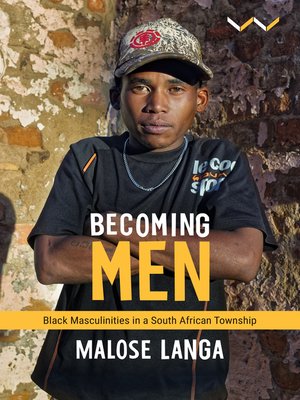
Sign up to save your library
With an OverDrive account, you can save your favorite libraries for at-a-glance information about availability. Find out more about OverDrive accounts.
Find this title in Libby, the library reading app by OverDrive.



Search for a digital library with this title
Title found at these libraries:
| Library Name | Distance |
|---|---|
| Loading... |
Becoming Men is the story of 32 boys from Alexandra, one of Johannesburg's largest townships, over a period of twelve seminal years in which they negotiate manhood and masculinity. Psychologist and academic Malose Langa documents in close detail what it means to be a young black man in contemporary South Africa. The boys discuss a range of topics including the impact of absent fathers, relationships with mothers, siblings and girls, school violence, academic performance, homophobia, gangsterism, unemployment and, in one case, prison life. Deep ambivalence, self-doubt and hesitation emerge in their approach to alternative masculinities premised on non-violent, non-sexist and non-risk-taking behaviour. Many of the boys appear simultaneously to comply with and oppose the prevalent norms, thereby exposing the difficulties of negotiating the multiple voices of masculinity. Providing a rich interpretation of how emotional processes affect black adolescent males, Langa suggests interventions and services to support and assist them, especially in reducing high-risk behaviours generally associated with hegemonic masculinity. This is essential reading for students, researchers and scholars of gender studies who wish to understand manhood and masculinity in South Africa. Psychologists, youth workers, lay counsellors and teachers who work with adolescent boys will also find it invaluable. Becoming Men is the story of 32 boys from Alexandra, one of Johannesburg's largest townships, over a period of twelve seminal years in which they negotiate manhood and masculinity. Psychologist and academic Malose Langa documents in close detail what it means to be a young black man in contemporary South Africa. The boys discuss a range of topics including the impact of absent fathers, relationships with mothers, siblings and girls, school violence, academic performance, homophobia, gangsterism, unemployment and, in one case, prison life. Deep ambivalence, self-doubt and hesitation emerge in their approach to alternative masculinities premised on non-violent, non-sexist and non-risk-taking behaviour. Many of the boys appear simultaneously to comply with and oppose the prevalent norms, thereby exposing the difficulties of negotiating the multiple voices of masculinity. Providing a rich interpretation of how emotional processes affect black adolescent males, Langa suggests interventions and services to support and assist them, especially in reducing high-risk behaviours generally associated with hegemonic masculinity. This is essential reading for students, researchers and scholars of gender studies who wish to understand manhood and masculinity in South Africa. Psychologists, youth workers, lay counsellors and teachers who work with adolescent boys will also find it invaluable. Understanding of new developments in publishing industry (Involves research and strategic thinking skills)|Becoming Men is the story of 32 boys from Alexandra, one of Johannesburg's largest townships, over a period of twelve seminal years in which they negotiate manhood and masculinity. Psychologist and academic Malose Langa documents in close detail what it means to be a young black man in contemporary South Africa. The boys discuss a range of topics including the impact of absent fathers, relationships with mothers, siblings and girls, school violence, academic performance, homophobia, gangsterism, unemployment and, in one case, prison life. Deep ambivalence, self-doubt and hesitation emerge in their approach to alternative masculinities premised on non-violent, non-sexist and non-risk-taking behaviour. Many of the boys appear simultaneously to comply with and oppose the prevalent norms, thereby exposing the difficulties of...







